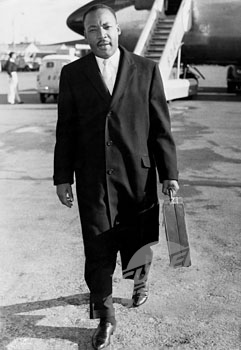 |
Dr. Martin Luther King traveled 25 days per month, 12 months a year during the final four years of his life. He promised his church congregation that unless he was traveling overseas, he would always return to preach every Sunday morning. And he did. (Photo by www.superstock.com) |
“In the light of the fact that the oppressed people of the world are rising up against that oppression; in the light of the fact that the American Negro is rising up against his oppression, the question is this: How will the struggle for justice be waged? And I think that is one of the most important questions confronting our generation. As we move to make justice a reality on the international scale, as we move to make justice a reality in this nation, how will the struggle be waged? It seems to me that there are two possible answers to this question. One is to use the all too prevalent method of physical violence. And it is true that man throughout history has sought to achieve justice through violence. And we all know the danger of this method. It seems to create many more social problems than it solves. And it seems to me that in the struggle for justice that this method is ultimately futile. If the Negro succumbs to the temptation of using violence in his struggle for justice, unborn generations will be the recipients of a long and desolate life of bitterness, and his chief legacy to the future will be an endless reign of meaningless chaos. And there is still a voice crying into the vista of time saying to every potential Peter put up your sword. And history is replete with the bleached bones of nations and communities that failed to follow this command.”
Martin Luther King Jr., from his speech, “Justice Without Violence,” April 3, 1957
Plan to attend
The 2007 Martin Luther King Jr. Day commemoration, sponsored by UNMC and The Nebraska Medical Center, will be Monday, Jan. 15 from noon to 1 p.m. in the Storz Pavilion on the lower level of Clarkson Tower. The program is free and open to the public.
Speaking at the event will be Valda Boyd Ford, director of the UNMC/The Nebraska Medical Center Community and Multicultural Affairs.
Ford is an internationally-acclaimed educator and strategist on diversity and multicultural initiatives who has extensive experience providing health services at some of the world’s largest refugee camps. She will focus on this aspect of her career and Dr. King’s worldview during her lecture, which is titled, “Extending the Dream: Realizing the Nightmare of Third World Refugees.”
For more information, contact Walter Brooks at 559-5768 or send an e-mail to wbrooks@unmc.edu.